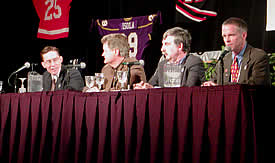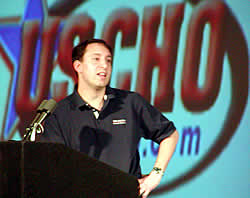On the eve of the final game of the season, college hockey fans received an opportunity to discuss championship issues, including the controversial seedings for this year’s tournament, at the third annual USCHO.com Town Hall Meeting.
In the Grand Ballroom at the Hyatt Regency Hotel, fans queued up to ask selection committee members Ian McCaw — the committee chair — Ron Grahame and Wayne Dean, as well as NCAA director of championships Tom Jacobs, whatever was on their minds concerning the newly-expanded 16-team tournament. Resembling the banter seen on USCHO’s message board, questioners were partisan, colorful, insightful, and persistent, often following up the panel’s answers with further remarks.
“There are no more loyal fans than those of college hockey,” Jacobs said after the event’s conclusion.
The first thing on several fans’ minds was the seedings, especially the scenario that sent Colorado College to Michigan’s home ice for the regional, where it lost to the host school.

“We were put in a situation where we were bound by the guidelines that were in place,” McCaw said. “Minnesota was a number-one seed and as a host school wasn’t going to go anyplace. Our hands were really tied by where CC was going to go. We weren’t going to put two number-one seeds in the same bracket, nor make them travel across the country. It was unfortunate, it was unfair, but there was no other place but Michigan.”
The panel defended its objective seeding system, and also the fact that a team like Maine was rated higher than its play down the stretch possibly merited.
“We have agreed upon a set of criteria, the PairWise, that everyone has heard about,” McCaw said. “We’ve found that people like to follow the rankings on USCHO to know where their team stands. The coaches agree.”
“We used to have a criterion, the last 16 games, that weighted performance at the end of the year,” Grahame added. “We took it out. Coaches felt it was not fair to just look at the end of the season. It’s what you do over the whole year that counts.”
Further questions on the seedings came from John Whelan, a proponent of the KRACH statistical rating system. During a technical discussion, he delineated several issues with the rankings including the number of comparisons examined, observing that with the MAAC and CHA receiving autobids, “for the foreseeable future, the gap between the 15th and 14th teams is considerably larger than the gap between 14 and 12.”
“When St. Cloud lost a comparison to Dartmouth, this was something we talked about,” McCaw said. “We will take a look at these matters over the summer to see how we can make the selection process more equitable.”

The committee also assured fans that issues such as Michigan frequently hosting regionals in Ann Arbor will abate because applications are piling up for future regional and Frozen Four sites. Jacobs noted that already two dozen applications have been received for the 2007 and 2008 Frozen Fours.
He also cautioned that sites are picked years in advance, “to allow preparation for an event of this magnitude.” When Michigan and Minnesota applied to host the regionals several years back, it was noted, they were the only plausible applications.
“It’s an open process [to become a tournament site] and it’s a process of aggressive solicitation,” Jacobs said. “We want a rotation of sites to bring the game to areas where it hasn’t been before.”
Between the serious discussions, the fans — in true message-board style — availed themselves of the podium to address less pressing issues. One supporter of Cornell strode up to the microphone to inform the committee that a pre-event video credited Ken Dryden with backstopping the Big Red to its perfect season in 1969-70, when the legend had graduated the previous year.
Not content to let the members bow their heads in shame, he demanded to know “what can be done to keep this mistake from occurring in the future” — and waited for a response.
Paul Dooley from Wakefield, Mass., brought applause by proudly declaiming, “I hate basketball,” when lamenting that the Frozen Four waits until after the Final Four has concluded. (He subsequently lost his audience during a discussion of his conversation with an NCAA official about attendance at the Northeast Regional, with no question forthcoming.)
All told, the forum provided an opportunity for fans to voice an opinion, and the panel warmly received them all. One even volunteered to design a new statistical selection procedure for the NCAA. It was an active give-and-take and sets the stage for next year’s meeting, which will be in Boston.


